

Stress: Signs, Symptoms, Management & Prevention. What is stress?
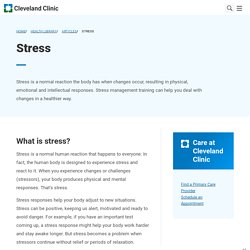
Stress is the body's reaction to any change that requires an adjustment or response. The body reacts to these changes with physical, mental, and emotional responses. Stress: Why does it happen and how can we manage it? Stress is a natural feeling of not being able to cope with specific demands and events. However, stress can become a chronic condition if a person does not take steps to manage it.
These demands can come from work, relationships, financial pressures, and other situations, but anything that poses a real or perceived challenge or threat to a person’s well-being can cause stress. Stress can be a motivator, and it can even be essential to survival. The body’s fight-or-flight mechanism tells a person when and how to respond to danger. The effects of chronic stress on health: new insights into the molecular mech... A whopping 92% of working Singaporeans are stressed – and women are prioritis... Pexels.
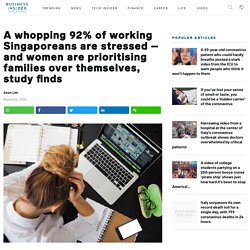
Singaporeans are among the most stressed at work, globally. Singaporeans are among the most stressed at work, globally, the 2019 Cigna 360 Well-Being Survey – Well and Beyond has revealed.
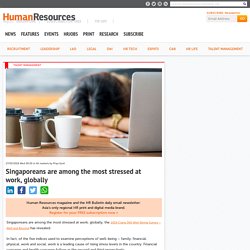
In fact, of the five indices used to examine perceptions of well-being – family, financial, physical, work and social, work is a leading cause of rising stress levels in the country. Financial concerns and health concerns follow as the second and third respectively. TODAYonline. SINGAPORE — Singaporeans are not only sleep deprived, but they are also among the most stressed at work globally, according to a survey by health service company Cigna released on Tuesday (Mar 26).

Nearly 92 per cent of Singaporeans surveyed were stressed from work, which was higher than the global average of 84 per cent. Of this group, 13 per cent said that the stress they faced was unmanageable. Singaporeans’ physical wellness index also dipped by 4.4 percentage points from last year, which the survey attributed to an increase in sleepless nights. Of the 23 markets surveyed, Singapore had the fifth lowest wellness index, which was measured across five key indices — family, financial, physical, social and work. Singapore fell by a place from last year as its wellness index went down by 1.7 points to 57.8. The survey collated about 13,200 responses from over 24 countries, with a sample of 502 respondents in Singapore. Read also “Vulnerability will make it seem that you are not as competent.
Stress at workplace —> if unmanaged —> burnout. Workplace Stress - The American Institute of Stress. Although the Institute is often asked to construct lists of the “most” and “least” stressful occupations, such rankings have little importance for several reasons.
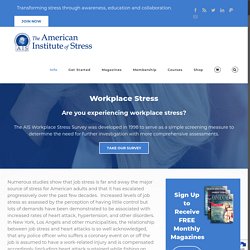
It is not the job but the person-environment fit that matters. Some individuals thrive in the time urgent pressure cooker of life in the fast lane, having to perform several duties at the same time and a list of things to do that would overwhelm most of us — provided they perceive that they are in control. They would be severely stressed by dull, dead-end assembly line work enjoyed by others who shun responsibility and simply want to perform a task that is well within their capabilities. The stresses that a policeman or high school teacher working in an inner city environment are subjected to are quite different than those experienced by their counterparts in rural Iowa. Stress in the Workplace.
Whatever your work demands, there are steps you can take to protect yourself from the damaging effects of stress, improve your job satisfaction, and bolster your well-being on and off the job.
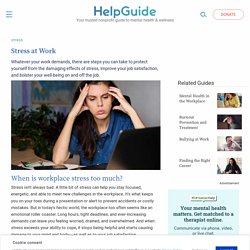
When is workplace stress too much? Stress isn’t always bad. A little bit of stress can help you stay focused, energetic, and able to meet new challenges in the workplace. It’s what keeps you on your toes during a presentation or alert to prevent accidents or costly mistakes. But in today’s hectic world, the workplace too often seems like an emotional roller coaster. Stress at the workplace. Coping one day and crying the next: Work-related burnout is real.
SINGAPORE: One day at work, Ms Jamuna Raj was striking off “to-dos” from a neat hand-written list, thinking she had a lid on all her tasks at work.
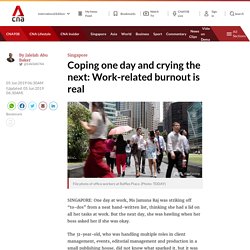
But the next day, she was bawling when her boss asked her if she was okay. The 31-year-old, who was handling multiple roles in client management, events, editorial management and production in a small publishing house, did not know what sparked it, but it was the start of her journey towards realising that she was experiencing burnout. How to cope with stress. Stress Management. How to handle stress at work. If you’re currently working, you probably know what it feels like to be stressed on the job.
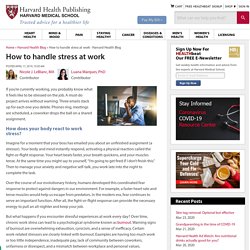
A must-do project arrives without warning. Three emails stack up for each one you delete. Phones ring, meetings are scheduled, a coworker drops the ball on a shared assignment. How does your body react to work stress? Imagine for a moment that your boss has emailed you about an unfinished assignment (a stressor). Over the course of our evolutionary history, humans developed this coordinated fear response to protect against dangers in our environment.
62 Stress Management Techniques, Strategies & Activities. What happens when we continue “burning the candle at both ends” until we reach physical and emotional exhaustion?
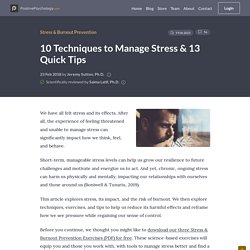
Just like the candle itself, we risk burning ourselves out. There is a parable of a frog sitting in a pot on the stove. If dropped into a pot of boiling water, a frog would likely notice and try to escape. But when placed in a pot that is slowly approaching a boil, the frog doesn’t notice until the water has already reached an unbearable heat—at which point it is too hot for the frog to survive.
Have you ever experienced a slow acceptance of the pressures around you, until everything is “just too much” and you can barely cope? If so, you’re not alone. So what if we could notice the boiling signs earlier and even “turn down” the heat? If stress “has become one of the most serious health issues of the 20th century and a worldwide epidemic,” then it is time to start growing the tools of how we handle stress (“Workplace Stress,” 2018).
16 Simple Ways to Relieve Stress and Anxiety. Stress and anxiety are common experiences for most people.
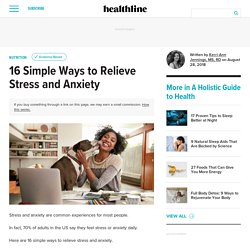
In fact, 70% of adults in the US say they feel stress or anxiety daily. Here are 16 simple ways to relieve stress and anxiety. Exercise is one of the most important things you can do to combat stress.